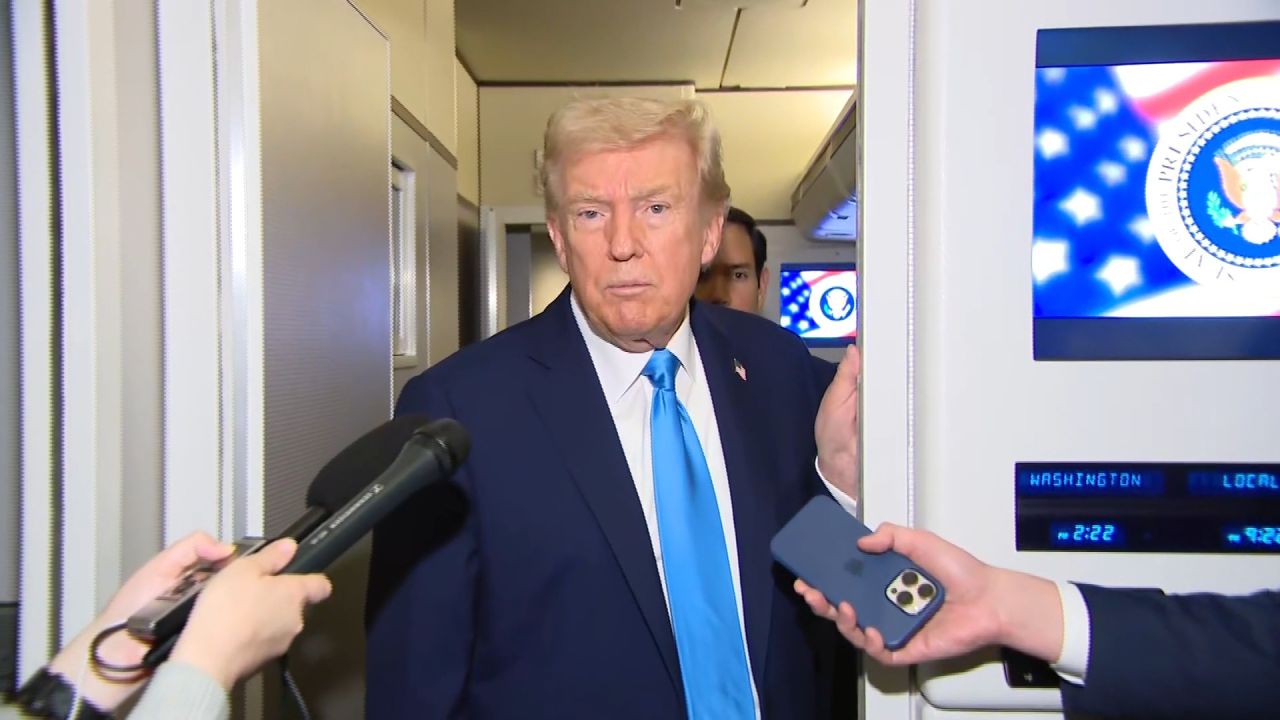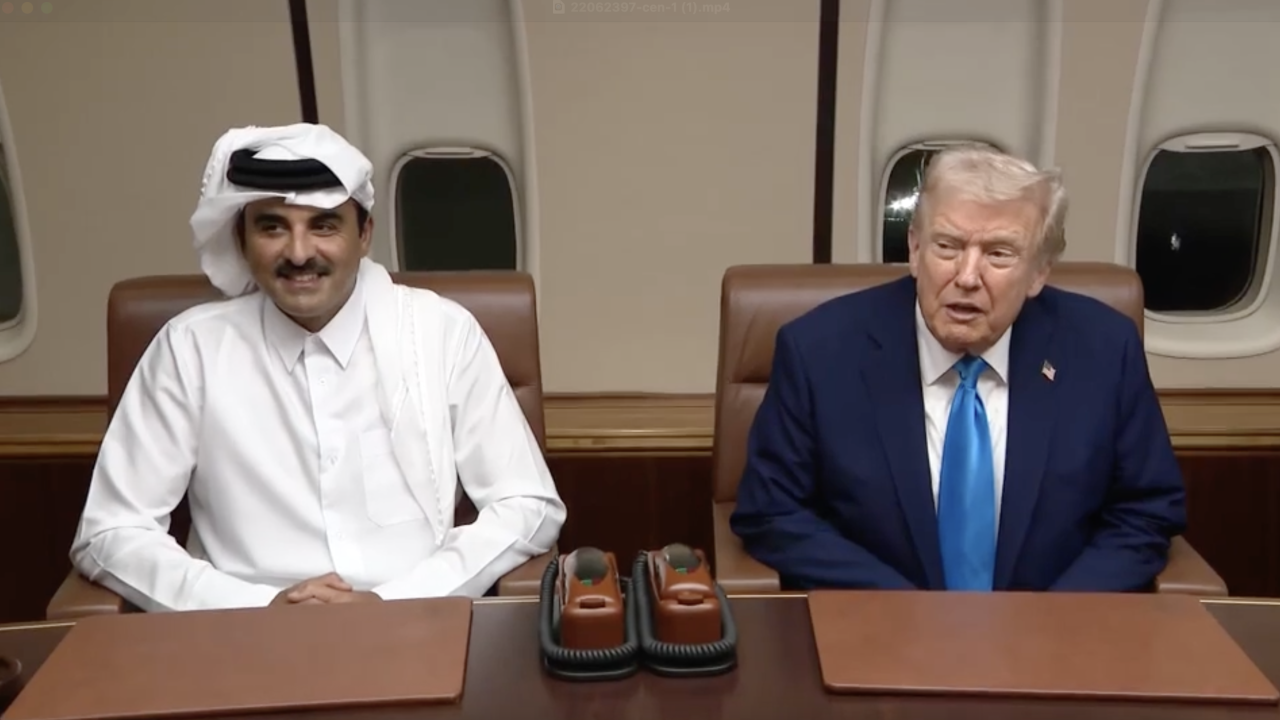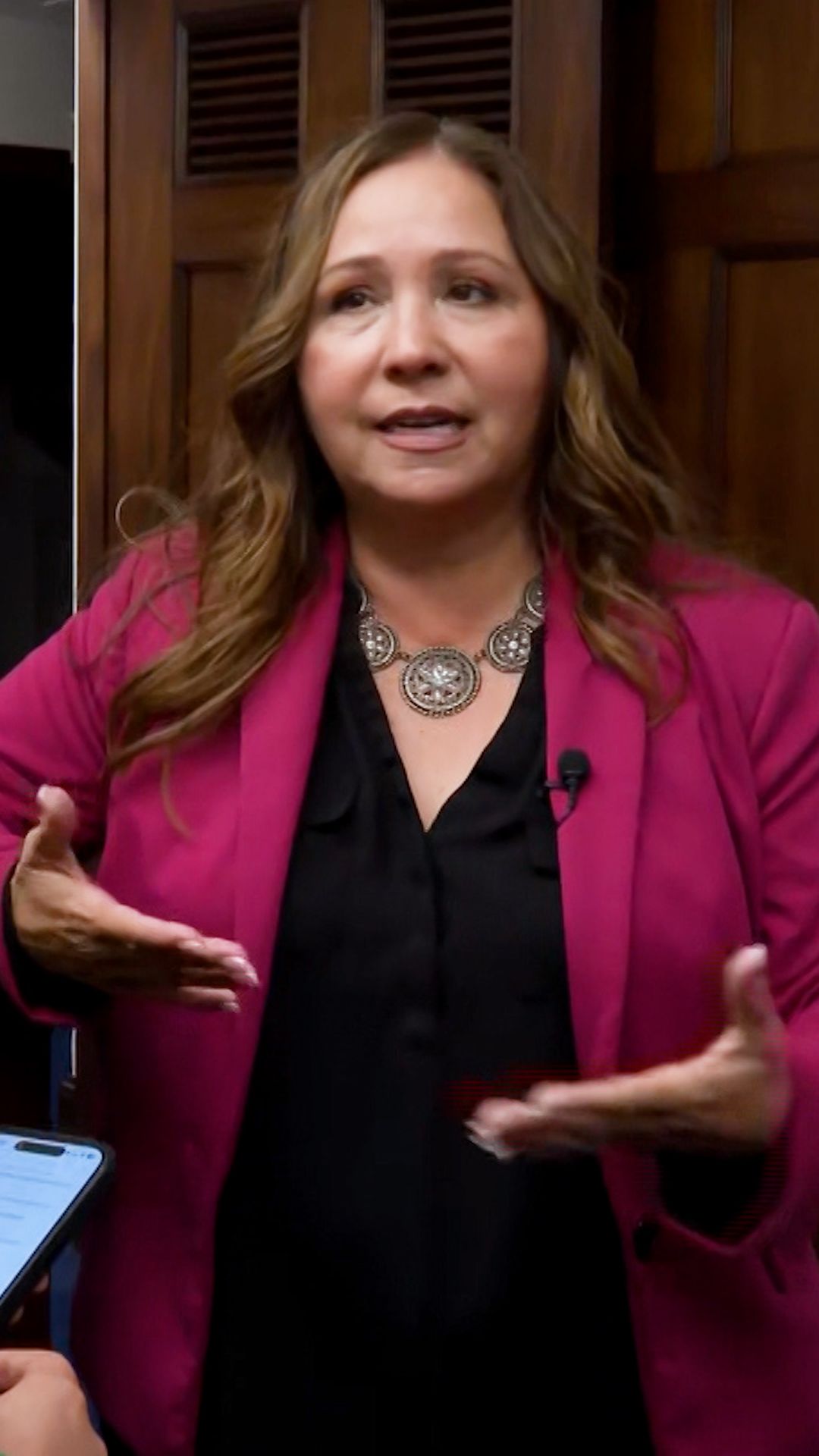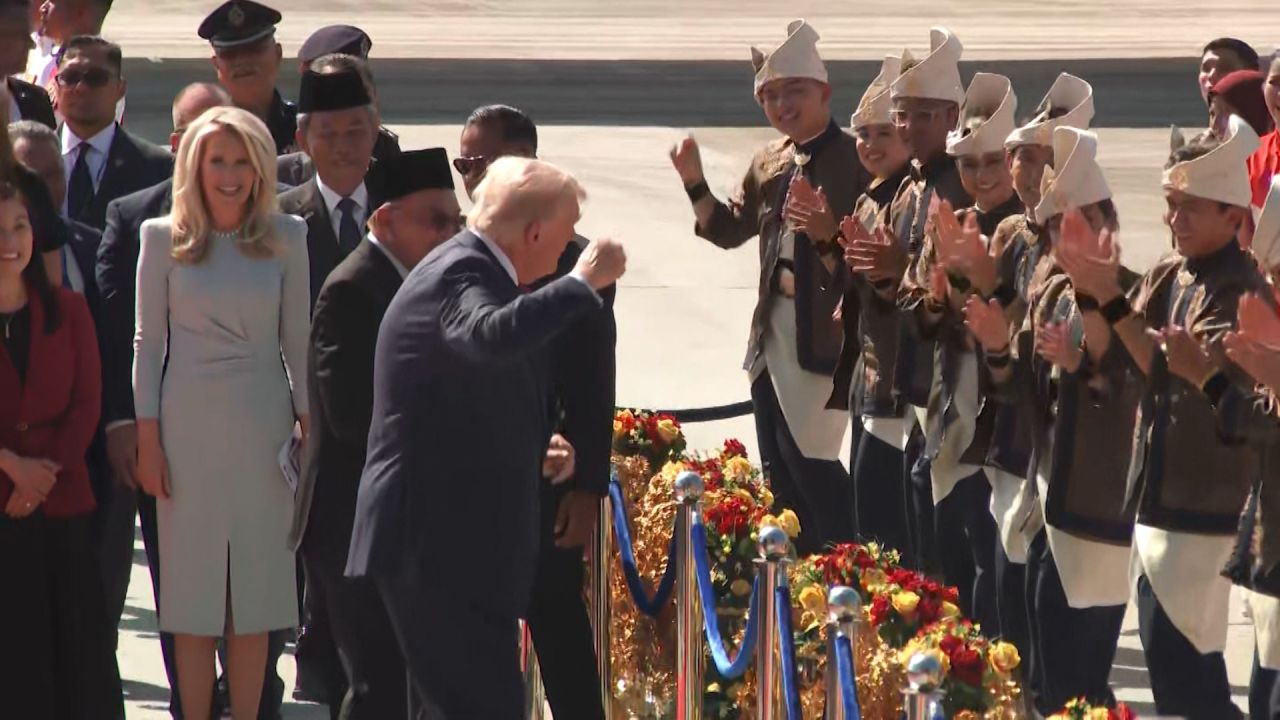What we covered
• Long-haul flight: US President Donald Trump has landed in Malaysia for the start of his high-stakes diplomatic visit to Asia, which will also include stops in Japan and South Korea. He is set to sign a peace agreement between Thailand and Cambodia upon his arrival.
• Trade tensions: The president announced mid-flight that he plans to increase tariffs on Canada by 10%, as he fumes over an anti-tariffs ad that the Ontario provincial government has been running in the US. He also said he hopes to secure a “comprehensive” trade deal at his highly anticipated meeting with Chinese leader Xi Jinping.
• Global conflicts: Trump, who briefly met with Qatar’s emir while refueling in Doha, is heaping pressure on Hamas to return the bodies of deceased hostages still held in Gaza. He also addressed Ukraine peace efforts, telling reporters on the flight that he won’t meet with Russian President Vladimir Putin until he’s sure “we’re going to make a deal.”
Our live coverage of US President Donald Trump’s trip to Asia has moved here.
US-China trade talks working toward “final details," US representative says
US Trade Representative Jamieson Greer expressed optimism for a potential US-China trade deal when President Donald Trump meets with China’s leader Xi Jinping later this week.
Greer, along with Treasury Secretary Scott Bessent, held meetings with top Chinese officials on Saturday and Sunday in Kuala Lumpur where, Greer said, they negotiated a framework for Trump and Xi to discuss at what is expected to be a high-stakes meeting with global economic implications amid a long-simmering trade war.
“I think we’re moving forward to the final details of the type of agreement that the leaders can review and decide if they want to conclude together,” Greer told reporters.
He described the discussions as “broad-ranging” and “constructive.”
“We had quite constructive discussions with our Chinese counterparts. We think we’re getting to a point where we have something we can present to the leaders,” he said, noting that there were talks about rare earth minerals, among other topics.
Negotiators, he said, are “getting to the spot where the leaders will have a very productive meeting this coming week.”
On Saturday, Trump indicated he was open to making some concessions as he suggested a “very good chance of making a very comprehensive deal.”
“They have to make concessions. I guess we would too. We’re at 157% tariff for them. I don’t think that’s sustainable for them, and they want to get that down. And we want certain things from them,” he told reporters aboard Air Force One.
Trump shakes off Taiwan questions ahead of five-day Asia tour
As he headed to Asia for a diplomatic swing expected to include a meeting with Chinese leader Xi Jinping, Donald Trump appeared wary of responding to questions from reporters on one of the thorniest issues in US-China relations: Taiwan.
Trump confirmed that the self-ruling democracy would be among topics discussed in the upcoming meeting with Xi, expected to take place on the sidelines of the APEC summit in South Korea next week.
But the US president had little to say on the subject when pressed by reporters traveling on Air Force One.
Asked whether he would consider changing US policy on Taiwan, Trump said he didn’t “want to talk about that now.”
The US president also said it “would be very dangerous” for China to make any move on Taiwan, when asked by a reporter why he had earlier said he did not think China wanted to invade the island.
Here’s some background: China’s ruling Communist Party claims self-governing Taiwan as its own, despite never having ruled it, and has vowed to take control of it, by force if necessary. Beijing in recent years has ramped up its military, economic and diplomatic pressure on Taipei.
The US maintains a close unofficial relationship with Taiwan and is required by law to provide it with the means for its defense – a relationship that irks Chinese officials and is seen by Beijing as the most sensitive issue among a host of frictions with the US.
Under Washington’s longstanding “One China” policy, the US acknowledges China’s position that Taiwan is part of China but has never officially recognized Beijing’s claim to the island of 23 million people. Washington has long maintained a policy that that it does not support Taiwan’s independence.
Analysts believe that Xi hopes for a key concession from Trump: a change in US policy to “oppose Taiwan independence.”
Canada’s trade minister hopes for “constructive discussions” with US, despite Trump’s tariff threat

Canada will focus on “constructive discussions” with America despite US President Donald Trump’s latest threat to hike tariffs by 10%, the country’s US-Canada trade minister Dominic LeBlanc said.
“We will remain focused on achieving results that benefit workers and families in both the United States and Canada, and that progress is best achieved through direct engagement with the U.S. administration — which is the responsibility of the federal government,” he added.
Some background: Canada has been trying to get trade talks with the US back on track after Trump said on Thursday that he was terminating negotiations due an ad from the Canadian province of Ontario that featured parts of an anti-tariff speech by former US President Ronald Reagan in 1987. Ontario has agreed to pull the ad from Monday.
Trump announced on Saturday that he intended to raise tariffs on Canadian goods by 10% “over and above what they are paying now.”
Trump en route to ASEAN summit

President Donald Trump is heading to the Kuala Lumpur Convention Center, where he will participate in events at the ASEAN summit, a gathering of Southeast Asian leaders.
His route from the airport to the summit is lined with welcoming ASEAN billboards and signage.
World leaders arriving on site drove past a Malaysian cultural performance this morning – a dozen performers dressed in traditional red and white ensembles dancing and drumming along the motorcade route. They were greeted by the prime minister on a red carpet in front of a screen of what appeared to be AI-generated moving greenery.
The drums were loud, and audible inside the convention hall, where members of attending delegations were hurriedly whisked past an international media center and multiple ASEAN-themed photo opportunities before arriving at the main site.
Trump dances his way into Malaysia
US President Donald Trump received a red-carpet welcome here in Kuala Lumpur, where dozens of special guests gathered, waving American and Malaysian flags as Air Force One taxied into place.
Trump descended the steps and warmly greeted Malaysian Prime Minister Anwar Ibrahim, walking past an honor guard to greet top officials.
Malaysian music played as dancers dressed in traditional ensembles performed – and the president walked toward them, dancing along to the beat, swaying his hips, and pumping his arms in the air for a brief, but memorable, moment.
The president held up an American and a Malaysian flag, as he smiled and greeted a welcoming crowd before boarding his motorcade.
Trump has a full agenda in Asia, but his meeting with Xi tops it
Trump touched down in Kuala Lumpur, Malaysia this morning for a five-day diplomatic tour, but the most consequential meeting on his agenda won’t come until later in the week.
The US president is expected to meet Chinese leader Xi Jinping on Thursday on the sidelines of the APEC summit in South Korea, the first face-to-face meeting between the two leaders since Trump’s return to office and the escalation of a fresh US-China tech and trade war.
Much is at stake in the meeting, with everything from the world’s supply of critical rare earths to the global shipping industry touched by the tussle between the world’s two largest economies.
Trump projected optimism while en route to Asia Saturday, saying he and Xi had a “really good chance of making a very comprehensive deal.”
Issues around tech and trade are expected to top the agenda, as the White House looks to push China to ease off on a sweeping expansion of rare earths export controls announced earlier this month. Xi and his officials will be pushing for the US to ease their own export controls around Chinese access to US high-tech.
Hanging over the entire proposition is the threat of the return of US tariffs so high they would amount to a de facto trade embargo on Chinese goods.
Trade negotiators from both sides are meeting in Kuala Lumpur this weekend to hammer out details ahead of the top-level talks. Unlike Washington, Beijing so far has declined to confirm that the two leaders will meet next week.
Trump arrives in Malaysia after telling prime minister, “I owe you a trip”

President Donald Trump has arrived in Malaysia, kicking off the first of three stops on the first Asia trip of his second term.
After nearly 24 hours of travel with two refueling stops, Air Force One was wheels down in Kuala Lumpur just before 10 a.m. local time Sunday.
A red carpet has been set upon the tarmac, and moments from now, Malaysian Prime Minister Anwar Ibrahim will welcome Trump with a formal arrival ceremony, offering the president the pomp and circumstance he enjoys.
Malaysia is hosting the ASEAN Summit, a gathering of South Asian leaders. Trump said he is making the stop in Kuala Lumpur to thank Anwar for his country’s involvement in helping to end the conflict between Thailand and Cambodia.
He added: “I told the leader of Malaysia, who’s a very good man, I said, ‘I think I owe you a trip,’ and that’s why we’re stopping in Malaysia.”
Trump is expected to join leaders from Malaysia, Cambodia and Thailand to sign the peace deal later Saturday.
Asia trip sets up a major test of Trump's dealmaking abilities
US President Donald Trump will lean on the power of in-person diplomacy on the first Asia trip of his second term as he meets with old rivals, new friends and, potentially, adversaries, while looking to cut deals that could have sweeping economic and national security implications.
But Trump’s love of tariffs — just like his unpredictable approach to relationships abroad — has generated uncertainty among once-solid US allies in the region, setting up a major test of whether the “Art of the Deal” author can deliver.
Trump arrives in Malaysia late Saturday (Sunday morning local time) for a six-day, three-country tour after having reimagined the role of the US in the world — a role he’s trying to defend against the rising influence of China, in particular, around the globe.
The “America First” president touts what he says are Trump-brokered ends to eight wars, including a fragile ceasefire for the Israel-Hamas conflict, and uses his tariff policy as leverage. And he’s said that the conflict whose resolution has been most elusive — Russia’s war in Ukraine — will be on the agenda during the highest-stakes meeting of the trip, with Xi Jinping, the leader of China, with which the US is embroiled in a simmering trade war.
Upon arrival in Kuala Lumpur, Trump will sign a peace agreement between Cambodia and Thailand, the president said Saturday.
Read more about what to look for during Trump’s trip here.
Trump says he will sign Cambodia-Thailand peace deal “immediately” upon arrival in Malaysia
President Donald Trump said Saturday that he will sign a peace agreement between Cambodia and Thailand upon his arrival in Malaysia, the first stop of his Asia trip.
“I am on my way to Malaysia, where I will sign the great Peace Deal, which I proudly brokered between Cambodia and Thailand,” Trump wrote in a Truth Social post.
The president, who has been traveling to Asia throughout the day, said the deal will be signed “immediately upon arrival.” He is set to arrive around 10 p.m. ET, which is Sunday morning in Malaysia. Trump also said he will meet with Malaysian Prime Minister Anwar Ibrahim when he lands.
The president also paid tribute to Thailand’s late Queen Mother, who died Friday, saying, “I send my condolences to the Great People of Thailand.”
Some background: Over the summer, Cambodia and Thailand agreed to a ceasefire following escalating violence on their disputed border. The ceasefire came after Trump spoke to the Thai and Cambodian leaders in an effort to restore peace, warning that he would not make trade deals with either country if the deadly border conflict continued.
Following the ceasefire announcement, Cambodia’s prime minister nominated Trump for the Nobel Peace Prize, lauding his “extraordinary statesmanship” in halting the border conflict.
Trump says he's increasing tariffs on Canada by 10% after Ontario's Reagan ad

President Donald Trump announced Saturday that he is increasing the tariff on Canada by 10% over current levels, after an advertisement from Canada’s Ontario province used the words of former President Ronald Reagan to criticize US tariffs.
Trump wrote on social media that “Canada was caught, red handed, putting up a fraudulent advertisement on Ronald Reagan’s Speech on Tariffs.” He said the purpose of the ad “was Canada’s hope that the United States Supreme Court will come to their ‘rescue’ on Tariffs that they have used for years to hurt the United States.”
“Because of their serious misrepresentation of the facts, and hostile act, I am increasing the Tariff on Canada by 10% over and above what they are paying now,” the president said.
The president’s post came after he said Thursday he was terminating trade talks with Canada, threatening once again to upend the crucial economic relationship between the United States and its second-biggest trading partner.
Some background: The ad, which pulls from a speech by Reagan, will be paused on Monday “so that trade talks can resume” between the two countries, Ontario Premier Doug Ford said.
But that’s only after it airs in the US during the first two World Series games between the Toronto Blue Jays and Los Angeles Dodgers — once last night and again later today. Trump on Saturday said, “they let it run last night during the World Series, knowing that it was a FRAUD.”
Ford said his government has “achieved our goal” by starting a “conversation” with the TV spot. For its part, the Ronald Reagan Foundation has claimed the ad “misrepresents” the former president’s speech on trade levies, and that the Ontario government had not asked permission to use the clip.
Trump warns Hamas to return hostage bodies, saying he’s “watching very closely” over the next 48 hours
President Donald Trump issued a warning to Hamas on Saturday, demanding the group begin returning the bodies of the deceased hostages quickly and saying that Arab nations involved in peace efforts would “take action” if Hamas fails to comply.
“Let’s see what they do over the next 48 hours. I am watching this very closely,” the president added.
The president’s post came shortly after a brief meeting aboard Air Force One in Doha with Qatari Emir Tamim bin Hamad Al Thani. Trump later told reporters the two discussed the Gaza peace deal during the stopover before continuing his trip to Asia.
Some context: Hamas has returned 15 of the 28 bodies of deceased hostages outlined in the US-proposed ceasefire agreement. The militant group previously said it had handed over all of the remains it could access, and that “significant efforts and special equipment” are needed to recover more.
Israel is allowing an Egyptian team with tools and equipment to enter Gaza and assist in the efforts to locate the bodies of the deceased hostages, two Israeli security officials told CNN on Saturday.
CNN’s Tal Shalev contributed to this post.
Trump praises Japan’s new conservative prime minister after “very good” phone call

President Donald Trump said Saturday he held a “very good” phone call with Japan’s new hardline conservative prime minister, Sanae Takaichi, describing her as “very friendly” and saying he looks forward to meeting her during his trip to Asia.
“She’s great, beautiful. We’re going to be seeing her very soon. She’s very friendly,” he told reporters aboard Air Force One.
The president added that Takaichi was a “very, very close ally and friend” of former Japanese Prime Minister Shinzo Abe, who was assassinated in 2022. Trump acknowledged that the former world leader “was one of my favorites.”
Takaichi, Japan’s first female prime minister, said in a social media post Saturday that Trump congratulated her on her new role.
Takaichi described their exchange as a “good and candid” conversation, adding that she appreciated Trump’s congratulatory message.
Trump is set to meet Takaichi in Tokyo on Tuesday morning local time.
Trump expresses hope for a “comprehensive deal” with China ahead of meeting with Xi
President Donald Trump said Saturday that he is hoping for a “comprehensive deal” ahead of his meeting next week with Chinese leader Xi Jinping.
Trump is expected to meet his Chinese counterpart next week when South Korea hosts the Asia-Pacific Economic Cooperation summit. The meeting comes at a precarious time for relations between the United States and China after both countries recently slapped sweeping measures on each other.
Russian oil: Trump also told reporters that he “may be discussing” purchases of Russian oil with Xi.
“You probably saw today China is cutting back very substantially on the purchase of Russian oil,” the president said Saturday.
Chinese state oil majors suspended purchases of seaborne Russian oil after the United States imposed sanctions imposed over the Kremlin’s invasion of Ukraine, multiple trade sources said Thursday.
Trump says no meeting with Putin until he’s sure “we’re going to make a deal”

President Donald Trump said Saturday he has no immediate plans to schedule a meeting with Russian President Vladimir Putin, insisting that any summit will have to wait until a potential peace deal between Russia and Ukraine seems achievable.
The president again said he had expected resolving the conflict to be easier, noting, “I could say almost any one of the deals that I’ve already done, I thought would have been more difficult than Russia, than Ukraine, but it didn’t work out that way.”
Some context: After Trump had a phone call with Putin last week, he was so convinced there was enough progress made that he announced he was heading soon to Budapest for an in-person summit.
Five days later, the summit was off and new sanctions on Moscow were on.
“It just it didn’t feel right to me,” Trump said Wednesday. “It didn’t feel like we were going to get to the place we have to get. So I canceled it.”

Trump says Gaza stabilization force will deploy “pretty quickly,” discussed ceasefire deal with Qatar’s emir
President Donald Trump said he discussed the Gaza peace deal with Qatari Emir Tamim bin Hamad Al Thani during a short meeting Saturday aboard Air Force One on his way to Asia.
Asked by reporters after the meeting — held during a refueling in Doha — when a stabilization force would be ready to deploy in Gaza, Trump replied, “pretty quickly.”
“They’re actually picking leaders right now,” the president said. “This is real peace.”
The US-brokered ceasefire plan between Israel and Hamas calls for the creation of an “International Stabilization Force” to be deployed to Gaza and train “vetted Palestinian police forces.”
Emphasizing his optimism for the region, Trump reiterated that the ceasefire deal “should be enduring peace.” Asked what would happen if the ceasefire fails to hold, Trump was quick to say that “it would be on Hamas.”
If it doesn’t hold, “then they’ll have a very, very big problem,” Trump said of Hamas.
The president has repeatedly warned Hamas to uphold its side of the ceasefire deal, which was reached earlier this month.
Trump meets Qatari emir in Doha during refuel stop on his way to Asia

President Donald Trump met a short time ago with Qatari Emir Tamim bin Hamad Al Thani in Doha, holding a brief meeting aboard Air Force One during a refueling stop on his way to Asia.
“As soon as I found out that he’s coming to refuel, I said, ‘I’m not going to allow him to take off unless I come and say hello,’” the emir said.
Trump returned the warm words, praising the emir as “one of the great rulers of the world.”
“I want to just say we express our thanks, and you have a safe Middle East right now, and you keep it that way for a long time,” Trump added.
Also present at the meeting was Qatari Prime Minister Sheikh Mohammed bin Abdulrahman bin Jassim Al-Thani, whom Trump described as “a friend to the world,” and Secretary of State Marco Rubio. The leaders did not take questions from the press.
Some context: Qatar has long been a broker in diplomatic negotiations, but its key role as mediator in the recent Israel-Hamas ceasefire talks further cemented its stature in the eyes of the US president.
The meeting aboard Air Force One comes as the US Air Force modifies a jet gifted to the administration by Qatar over the summer, which is being eyed as a potential replacement for the presidential aircraft.
Secretary of State Marco Rubio holds call with Israeli prime minister
US Secretary of State Marco Rubio had a phone call with Israeli Prime Minister Benjamin Netanyahu to cap off his trip to Israel this week, the prime minister’s office said in a statement today.
The two discussed the outcomes of Rubio’s “productive” visit, according to the Israeli statement.
Netanyahu and Rubio talked about the efforts to return the remains of deceased hostages still held in Gaza, disarm Hamas and demilitarize Gaza, the prime minister’s office said. Netanyahu thanked Rubio for his “steadfast support” and commitment to the countries’ alliance.
Earlier today, Rubio and US Ambassador to Israel Mike Huckabee met with American-Israeli hostage families. The secretary of state has now joined President Donald Trump en route to diplomatic visits in several Asian countries.
Reporting roundup: Shutdown impacts, immigration crackdown and more on the administration

It’s been another whirlwind week in CNN’s coverage of President Donald Trump’s administration.
If you’re just catching up over the weekend, you can read today’s posts on the president’s Asia trip, the breakdown in trade talks with Canada and the US military’s strikes in the Caribbean against alleged drug trafficking operations.
Ready for more? Use the links below to catch up on other key storylines:
Government shutdown: Furloughed federal workers are finding it hard to file for jobless benefits. And the Trump administration is sending mixed messages on the availability of food stamps if the shutdown continues next month.
Immigration crackdown: From federal agents crashing their cars to alleged “rammings” involving activists, chaos on the road is becoming a hallmark of Trump’s deportation push. CNN also took a look at the administration’s vastly expanded targets for deportation, including a father who is the sole caretaker for his disabled son.
Refugees go hungry without US aid: Secretary of State Marco Rubio said cuts to foreign aid were to slash bureaucracy. But refugee children face starvation without life-saving supplies from the US.
East Wing demolition: Trump’s razing of the White House’s East Wing speaks to his wrecking-ball presidency, CNN’s Stephen Collinson wrote in an analysis piece. The demolition included the White House movie theater, which former President Bill Clinton once called the “best perk” of the job.
Still not sworn-in: Frustrated Arizonans have waited more than a month for their new congresswoman to be seated. House Speaker Mike Johnson refuses to swear in Democratic Rep.-elect Adelita Grijalva in another ripple effect of the government shutdown.
Watch CNN’s interview with Grijalva below:

Standing in her empty office on Capitol Hill, Arizona Rep.-elect Adelita Grijalva explains to CNN's Annie Grayer how she's been waiting a month to be sworn in after she was elected in a special election.
CNN reporter breaks down whether Trump could meet with Kim Jong Un
President Donald Trump says he would like to meet with North Korean leader Kim Jong Un during his trip to Asia. But is that logistically possible?
CNN’s Will Ripley explains why he’s feeling a bit of deja vu:

President Donald Trump says he would like to meet with North Korean leader Kim Jong Un during his trip to Asia. But is that logistically possible? CNN's Will Ripley explains why he's feeling a bit of deja vu.





